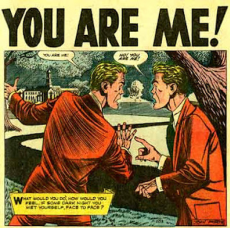
Email: reecejordan98@hotmail.co.uk
Total Article : 168
About Me:18-year-old sixth form student, studying English Literature, History and Government and Politics. My articles will broadly cover topics from the current affairs of politics to reviews of books and albums, as well as adding my own creative pieces, whether it be short fiction or general opinion.

But it is not just the Handmaidens that are identical replicas of each other. Offred finds an affiliation with Serena Joy, the Commander’s wife. Offred states, ‘I see the two of us, a blue shape, a red shape, in the brief glass eye of the mirror…Myself, my obverse.’ Though Serena Joy is Offred’s opposite in terms of their hierarchal position within the Gilead regime (‘obverse’), she is nonetheless her identical in that both are women under the authoritarian principles of such a regime, both are victims.
The regime itself, with its utopian elements is also another kind of double or doppelganger, and that is of the fairy tale genre. When seeing herself in a mirror, Offred notices that she looks like ‘some fairytale figure in a red cloak’. This ‘fairytale figure’ clearly mimics the aesthetic of Little Red Riding Hood. Jack Zipes, one of the leading voices on the fairy tale as a genre and its development, states that, ‘The active struggle [within fairy tales] against unjust and barbaric conditions in the world leads to home, or utopia.’ Offred’s narrative itself reads as a fairy tale in so far as it shows her ‘active struggle’ against an ‘unjust’ and ‘barbaric’ authoritarian regime. It also comes under Zipes’ definition of ‘the underdog, the small person, [using] his or her wits not only to survive but to live a better life’, which is evident in how she spends time with the Commander in order to receive certain liberties.
However, the primary double of the fairy tale genre isn’t Offred’s narrative of struggle against the regime, but the very regime that she is struggling against. This is because the regime attempts to constructs its own ideal, its own utopia. As André Favat states, the fairy tale ‘is no casual recreation or pleasant diversion; instead, it is an insistent search for an ordered world more satisfying than the real one’. The novel is littered with the regime’s imposition of supposed ideals which bring about an ‘ordered world’, or one which may be seen to be ‘more satisfying’ than what came before it. For example, the regime presents a particular feminist ideal that women are free from the sexualised standards set by magazines and industry, something striven for even by Offred’s overtly feminist mother (‘[the magazine] had a pretty woman on it, with no clothes on’ / ‘Here, she said to me toss it in [to the fire], quick’). The regime soon rid of all but a few magazines, the impetus for which, the Commander tells, is, ‘they [women] were always complaining. Remember the ads in the Personal columns, Bright attractive woman, thirty-five… This way they all get a man, nobody’s left out’. When speaking of the time before the Gilead regime, Offred says ‘Women were not protected then’.
Image Credits: scalar.usc.edu

0 Comment:
Be the first one to comment on this article.